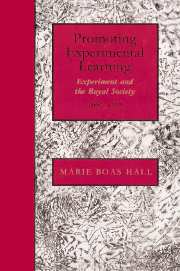Book contents
- Frontmatter
- Contents
- List of figures
- Preface
- A note on dates
- 1 Introductory
- 2 Aims and ideals
- 3 The record of the minutes 1660–1674
- 4 The communication of experiment 1660–1677
- 5 The record of the minutes 1674–1703
- 6 The communication of experiment 1677–1803
- 7 The record of the minutes 1703–1727
- 8 The communication of experiment 1703–1727
- 9 The view of the world; friend and foe
- Abbreviated titles
- Notes
- Bibliography
- Index
4 - The communication of experiment 1660–1677
Published online by Cambridge University Press: 03 December 2009
- Frontmatter
- Contents
- List of figures
- Preface
- A note on dates
- 1 Introductory
- 2 Aims and ideals
- 3 The record of the minutes 1660–1674
- 4 The communication of experiment 1660–1677
- 5 The record of the minutes 1674–1703
- 6 The communication of experiment 1677–1803
- 7 The record of the minutes 1703–1727
- 8 The communication of experiment 1703–1727
- 9 The view of the world; friend and foe
- Abbreviated titles
- Notes
- Bibliography
- Index
Summary
Besides the performance and the description of experiments at meetings, there were other ways, both formal and informal, by which the Royal Society and its Fellows sought to promote the Society's experimental aims and ideals. There was the writing and publication of works wherein the Society's aims might be praised, exemplified, interpreted and urged as models to be followed, and this on many levels. There was the communication to those, at home and abroad, not able to attend meetings, of what was being done at those meetings, as likewise the solicitation of exchanges of discoveries, experiments, inventions and views from such absentee members. And there was the encouragement of the fruits of experimental learning by the sponsoring of publication, in many and various forms.
That the Fellows constantly tried to exemplify the aims and ideals of the Society in their writings is very well known but worth stressing again. Of all the earliest Fellows, none was so zealous or so successful in this regard as Robert Boyle, who, as a virtually unknown natural philosopher, blazed into fame in 1660 as the author of a most remarkably experimental treatise, New Experiments, Physico-Mechanical, Touching the Spring of the Air and its Effects. It was topical, it was innovative and it was shot through and through with the author's profound belief in the value of experiment for discovery and, implicitly, for the testing of theory.
- Type
- Chapter
- Information
- Promoting Experimental LearningExperiment and the Royal Society, 1660–1727, pp. 50 - 65Publisher: Cambridge University PressPrint publication year: 1991



